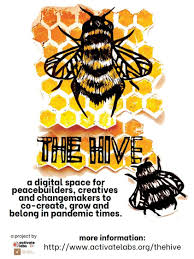Nailing It

This is the fourth and final blog post in which I explored the things we could and should do if we want to spark broader social and political change in the aftermath of the corona virus pandemic. During these confusing times when we have had to stop or at least dramatically alter the work we were doing, I’ve used the time I’ve spent sheltering in place to think about the implications of the COVID-19 epidemic for the work I’ve been doing for the last half century. It may not look that way here, but each of the titles is a clickable link!
May 1 Changing the (Coronavirus) Narrative
May 8 We’re In It Together
May 15 Going to Scale
May 22 Nailing It
The first three posts in this series dealt with some basic principles about how we can respond to the coronavirus pandemic and a whole lot more. They therefore revolved around some core concepts that have been at the heart of my professional life for the last fifty years.
More importantly, they could be seen as way too abstract.
That’s the case because left a key “elephant in the room” until last. As you are about to see, that “elephant” has been in my social change “room” that whole time. Ignoring it has always been a problem. Now, it’s a problem on steroids.
Poll after poll and academic study after academic study has shown declining rates of trust in authority in the United States and most of the rest of the advanced industrialized world. Part and parcel of that disaffection with the powers-that-be is the similarly growing sense that average citizens like ourselves can’t make a difference.
To my surprise—and my delight—the pandemic is also showing us ways of getting around those spirals of discontent and powerlessness.
Kelly Corrigan
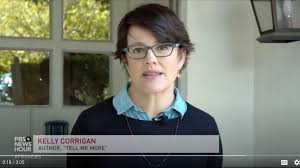 You can begin to see that path forward by watching three remarkable minutes of television news I first saw on April 29.
You can begin to see that path forward by watching three remarkable minutes of television news I first saw on April 29.
I turned on the PBS NewsHour that night, which was also the day I first realized that this had to be a multipart series of blog posts that had to end by my going face to face with the elephant.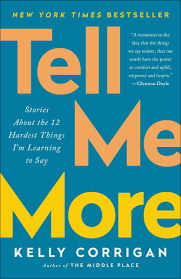
Frankly, I didn’t expect to see much uplifting news from the program that night. The first fifty minutes of the hour met my expectations by including plenty of news, almost all of which was bad.
Then, Judy Woodruff began what is normally one of my least favorite parts of the program—a brief but spectacular moment. She said she was going to turn the microphone over to award-winning author Kelly Corrigan. To be honest, I’d never heard of her. After I watched Corrigan, I immediately bought her most recent book, Tell Me More and started sharing the video with my friends as soon as it was posted on the NewsHour site.
So, your first task is to click the link below and watch it yourself.
Since I’m sure you didn’t catch every word amid the wonderful graphics, here’s a transcript.
Sometimes, when I feel outmatched by the thing in front of me, I do a little mental exercise.
I tell myself the story of what happened, as if it’s over and I nailed it.
This morning, I waited for 54 minutes to check out from the Safeway. The woman behind me, whose hair and makeup was perfect, had seven bottles of Martini & Rossi Vermouth. That’s it.
And the guy in front of her had a full-face double ventilator gas mask. And I felt outmatched by the thing in front of me.
So, right there, I told myself the story of the 2020 pandemic and how we nailed it.
My success fantasy went like this. At first, it was awful, nothing but bad news on top of bad news. But then we rose up. We made soups and stews for old people and dropped them off, so they felt included and secure and nourished.
We read books to children over the Internet. We stepped outside at the end of the day and played music and clapped, so that each of us knew we were not alone.
We sent pizzas and Chinese food to E.R.s to sustain both our hospitals and our restaurants. We called old friends and told them things we’d forgotten to say: I miss you. I still think of you. Remember that time?
We turned up, all of us, on our screens to keep businesses afloat. And in so doing, we’re exposed to the more tender elements of our colleagues’ lives. Pets and children were now, to our mutual benefit, in the frame.
People figured out they don’t need fancy equipment to exercise. We stopped flying around and jumping in cars for no reason. Everyone planted things they could eat. We played cards with our families. We had long conversations.
We identified what kind of learning can be delivered online. We discovered that teaching is the most complex, high-impact profession known to man, and we started compensating our teachers fairly for their irreplaceable work.
Everyone voted after coronavirus. Kids who lived through the virus valued science above all. They became researchers and doctors, kicking off the greatest period of world positive discovery and innovation the planet has ever seen.
We came, finally and forever, to appreciate the profound fact of our shared humanity and relish the full force of our love for one another.
Wouldn’t It Be Wonderful If All of That Came True
I didn’t notice it at the time, but Judy Woodruff ended the segment and the program in a way that drove Corrigan’s point home for all of that night’s viewers and especially for those like me who took her line about “nailing it” to heart..
Thank you, Kelly Corrigan.
And wouldn’t it be wonderful if all of that came true?
How Would We Nail It? A Different Kind of Activism
As I argued last time, we actually know a lot about how such a movement could go to scale. At the heart of all those theories of movement development is a simple fact.
You can’t build a movement without activists.
That, in turn, means helping potential activist overcome three related beliefs that I alluded to earlier. First, we can’t make a difference because“they” won’t change—whoever “they” happen to be from your perspective. Second, it is hard to be an activist because we all have jobs, families, and more that eat up our time. Finally and perhaps most importantly, there is now something almost distasteful about activism in this age of deep polarization and alienation from political life.
In short, we are having a hard time building the kind of movements that could let us nail it in the real world–rather than the academic texts that showed us how to build a movement.
Then, I had an unexpected unplanned epiphany after I showed Corrigan’s video to my largely apolitical sister.
She and I had a conversation planned in which I would get her up to speed on using Zoom since it was going to be used as the platform for a virtual hammered dulcimer workshop she is going to in a couple of weeks. The workshop was going to be held near one of the campgrounds they visit six months a year now that they have retired. Like everything else, the live workshop was canceled and moved to Zoom.
Although she didn’t tell me in advance, she wanted to learn how to share screens, so I hadn’t anything prepared when she asked me how one did that. I did have a few things open on my desktop, including the first draft of this post, which I was certain would put her to sleep.
Then, I remembered I had Corrigan’s talk open on my browser. So, I asked her if she had three minutes to spare and played it.
Recall that my sister is not a political activist despite (or perhaps because of) the fact that her older brother has been one for all these years.
I realized two things almost immediately.
- She (and you) can be a Corrigan style activist without consciously becoming one or even thinking you are getting involved in (the distasteful world of) political life. What’s more, you can nail it without abandoning what you do every day. Although you do have to change how you do it. for someone like my sister (or Corrigan), you don’t have to change it a lot because they both have been this kind of activist for their entire lives.
- In fact, I have been talking about and practicing that kind of activism since the early 1980s in ways that actually more sense today than ever before, including during the peak of my own political career when I “majored” in ending the war in Vietnam as an undergraduate.
Yes, we will need conventional social and political movements if we want to go to scale outward and upward in the ways I mentioned in the previous post.
But, my more important point is that we won’t have a chance to go to scale in those ways unless and until thousands and millions of us become Corrigan-style activists who have thought through how to nail it in their own lives and taken steps to make it happen in those parts of our society they live in.
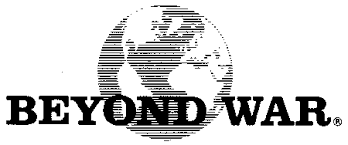 We did start doing some of that in the Beyond War movement in the early 1980s when we helped people deal with conflict in their everyday lives more constructive. We probably reached a half million people who sat through our three evening workshop on building a world that found new ways of settling its disputes.
We did start doing some of that in the Beyond War movement in the early 1980s when we helped people deal with conflict in their everyday lives more constructive. We probably reached a half million people who sat through our three evening workshop on building a world that found new ways of settling its disputes.
Along the way, we also made a huge and fatal mistake. We didn’t spend enough time scaling outward or upward . In fact, we didn’t even try to set up Beyond War networks in the Washington DC area.
However, we did get some things right which we could easily adapt to the changed conditions of the early 2020s. We talked about building a world beyond war in the microcosms of peoples’ daily lives, we were talking about the same kind of activism Corrigan described. Though we didn’t use her terminology, we were helping people figure out how to nail it in their everyday lives.
So, I went back to my mental drawing boards and reconfigured four of the key points we emphasized for the world we live in today.
Think Differently. We built Beyond War off of the middle of Einstein’s sentence that “the unleashed power of the atom has changed everything save our modes of thinking and thus we drift toward unparalleled catastrophe.” As we saw it, our modes of thinking or the often unspoken values and assumptions we brought to our problems had to change along the lines I wrote about in the last three blog posts. You can find links to them at the top of this one.
Decide … We spent a lot of time playing with the word decision which has the same roots as incision which means to cut into. By contrast, a de-cision means to cut away from. Thus, we asked people to make a clean break away from values and assumptions that led us to war and almost every other kind of conflict despite the fact that there almost always were alternatives. We also helped people see that this would not be an easy decision and would actually change your life forever because…
… to live differently. We asked people to deal with their conflicts in a way that reflected the interdependence of all life as laid out in everything from the world’s major spiritual traditions to modern systems theory.We asked people to commit themselves to solving the problems they faced and not ducking them. Both the ancient traditions and the newest scientific discoveries led us to search and work for cooperative solutions to our problems without, as we put it then, “preoccupying ourselves with an enemy.” Today, I would express that as an understanding that just about all parties to a dispute have to be part of the solution. In my case, that means including many of the people who support the Trump administration. That, in turn, requires, maintaining what we called “a spirit of good will” thirty years ago. Today, it might make more sense to think of it more in Corrigan’s terms–tell yourself the story of the 2020 pandemic or any other problems you face and how you nailed it. Trust me (but do think through it for yourself) that almost any version of nailing it that you can come up will require a broadly based and cooperative solution.
Create exponential growth. We then asked people we worked with to build a movement that could grow exponentially. We showed them that if we each convinced ten people a year to share the values I just discussed, we would create an unstoppable movement within a few years. Obviously, that’s where we fell far short of the mark. Today, the coronavirus pandemic has helped many of us see what exponential growth can look like. That’s even true of my third grade grandson and his friends who watched the remarkable video, Power of Ten, with me while their school was suspended (on Zoom, of course). I showed a version of that video in the 1980s, and it landed with a thud. Now, people react with something akin to the enthusiasm I get when I play Corrigan’s video.
Going to Scale
As everyone from the conservative scholar Arthur Brooks to his Holiness, the Dalai Lama, has pointed out, you feel better about yourself in the world when you live your life this way. More importantly, people notice that you are acting differently and are often open to discussing why that’s the case in which it’s possible to involve the title of Corrigan’s book and “tell me more.”
At the same time, we have to learn the lesson we flunked in the 1980s.
To make build that kind of unstoppable movement, my sister and the rest of us will have to change what we do ever so slightly and act like an activist just a wee bit. In the course of the conversations they have about the pandemic or any other problem they confront, they will have to talk about why they are doing things differently and help their colleagues see that they, too, can be part of something bigger.
At that point, it becomes time for traditional activists like myself to build on what reluctant activists like my sister accomplish with their grandkids or the people they meet at their campgrounds and folk festivals. We have to provide the organizational glue that ties these initiatives together so that they can spread to other communities and impact other issues and, eventually, change public policies here in Washington.
If I ask average citizens to only do that, I am almost certainly going to fail. My sister and just about every other average American lack the time and the resources to do that. If they think they can make a difference on their own, they will, in fact, learn that they don’t have much power.
We shouldn’t ask or expect them to do that. We can realistically ask them to make a difference when it comes to the problems they face in their daily lives and provide them with a larger effort of which they can be a part.
We will need both—something we learned to our chagrin with the Beyond War movement after the Berlin Wall came down and the issues that initially drew people to us disappeared. Political activists today have to learn that we need to shift cultural norms, too, by reaching out to people like my sister and help them deal with the problems they face in their every day lives. We need to help them deal with their equivalents of the women with the bottles of vermouth and the guy in the gas mask whom Corrigan met at her supermarket.
The NewsHour Revisited
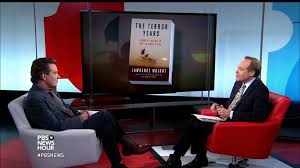 Let me now end this post with another example that came at the end of a more recent PBS NewsHour. On May 19, Jeffrey Brown interviewed Lawrence Wright about his brand new and eerily appropriate novel, The End of October. (Unfortunately, I couldn’t find a picture of that interview. I did find this one of the two of them discussion Wright’s earllier book, The Looming Tower. Like the rest of us, they’ve both aged a bit in the last fifteen years)
Let me now end this post with another example that came at the end of a more recent PBS NewsHour. On May 19, Jeffrey Brown interviewed Lawrence Wright about his brand new and eerily appropriate novel, The End of October. (Unfortunately, I couldn’t find a picture of that interview. I did find this one of the two of them discussion Wright’s earllier book, The Looming Tower. Like the rest of us, they’ve both aged a bit in the last fifteen years)
I, frankly, only started reading the book because I had worked with Wright a few times on other issues and knew that he was a great writer who had learned a lot about pandemics. In fact, the book is so accurately depressing that I couldn’t finish it because it was so accurate and depressing.
So, I wanted to hear what he had to say that night (and, no, there wasn’t a spoiler alert about how the plot ended). At the end of the interview, he told Brown about what he thought the real stakes of the COVID-19 crisis and his fictional pandemic were:
I see us being at a kind of crossroads, Jeff.
I mean, it — this — a great pandemic, or like a war or a depression is like an X-ray on the society you live in. And now, suddenly, we can see everything. All the faults of our society are clearly on view. And we can address that now or we can fail.
If you look back at our own history, we had World War II. You know, we became the biggest manufacturing and commercial country in the world’s history. But then, you know, after 9/11, where we had a similar inflection point, I thought the country was going to make great changes, but, instead, we invaded Iraq.
We can make a change that will lead us to a stronger and more unified future, or we can forfeit this opportunity. And I hope that we don’t do that.
My job is to build on the points I’ve made over the last four weeks and see that we rise up to and meet Wright’s challenge.
In fact, while I was getting ready to finish this post, I sat in on a meeting of Imperative 21, a new organization that is devoted to transforming capitalism into an economic system that works for everyone in the light of the pandemic. It is a coalition of C suite whose one page web site declares
Capitalism must work for all of us and for the long-term. Imperative 21 is a business-led, cross-sector coalition working to align incentives and shift culture so capitalism works for the benefit of all stakeholders. Together, and with others, we will support business and finance leaders who are ready to turn bold promises of a new corporate purpose into meaningful action.
Don’t be misled by the single page. Over three hundred people were on the call, including some leading names from the arts, finance, and technology that you would probably recognize.
My sister’s job is to integrate what Beyond War called a new mode of thinking into the ways she deals with everyone from her grandkids to her fellow hammered dulcimer players. The same holds for a new initiative I’m part of, The Hive, that is bringing peacebuilders together to share their fears and hopes–in that order.
If both my sister and I–and you, Imperative 21, and The Hive–each do our parts, we just might nail it.
The views and opinions expressed in this article are those of the author and do not necessarily reflect the official policy or position of the Alliance for Peacebuilding or its members.
Also published on Medium.

